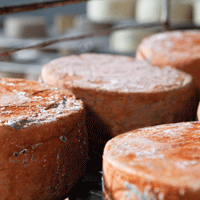Ruth Klahsen’s creative thinking sets Stratford, Ont.’s Monforte Dairy apart
Ruth Klahsen is the woman behind monforte dairy, but if you ask the entrepreneur her title, you won’t get the typical answer. “I guess, I’m the proprietor,” she answers. “But, more than anything, I’m just trying to make cheese.” It’s that humble, no-nonsense attitude that has carried the Stratford Chefs School alum through the past decade.
Klahsen’s entrepreneurial journey began in 2002 when she worked as a chef for the Stratford Festival in Ontario, earning $32,000 per year — until a pay hike changed her life. “They doubled my salary, and then it was time to leave,” she recalls, explaining a bigger salary meant she’d have to pay staff more and charge more for food. “It wasn’t fun anymore.”
During the next year, Klahsen finished her stint at Stratford, while planning her next move. At that time, she weathered a divorce, applied for midwifery school, (was rejected) and joyfully turned to cheesemaking, joining with her original business partner, SebastianoMonforte, to open the namesake Monforte Dairy.
The partnership didn’t last, but the business thrived until 2009 when Klahsen discovered her Millbank, Ont., lease wasn’t being renewed. Refusing defeat, the businesswoman launched the Year of the Renaissance 2010, a campaign to raise funds to build a new dairy through the sale of cheese futures. A donation of $500, for example, bought $750 worth of vouchers or two $75 baskets of product. Thanks to public local-food supporters, Klahsen raised almost $500,000.
Today a 5,500-square-foot space located in Stratford, Ont., accommodates the new dairy and retail store. “It’s nicer — there’s windows,” jests the 54-year-old, before changing her tone. “It’s a beautiful dairy; we’d love to use it as a model of how dairies can get built for [a reasonable price]. But, it wasn’t an easy process. “We incurred debt, hemorrhaging out, not knowing what we were doing with stuff; that’s why we ended up $1.4 million in debt, but the dairy itself was under a million dollars.”
So far, $250,000 of the company debt has been repaid, and with $1.4 million in sales in the last fiscal year, Klahsen is inching closer to her “sweet spot” of $2 million, which will translate to more debt repayment and profit. She’s not selling new cheese subscriptions, as the bank feels it overextends the company, but she’s adjusting to restarting an established business. “We’re back in that start-up [phase],”Klahsen says. “We had gotten to that five-year [mark] in the other plant, making money. That five-year thing is so sweet — you start to sleep and you stop drinking so much,” she jokes, recalling the days in Millbank. And now? “We’re right back in it; we’ve been in it for a year and a half, so it’s still really scary, chasing money like crazy.”
But, money isn’t the only challenge. The metaphorical hole in the Canadian dairy industry is the absence of education. “There’s nowhere to learn how to make good cheese in Canada. God, you keep learning, but it’s so hard; we really need a school,” says the self-taught cheesemaker who is concerned about the state of local dairy production. “Why in Canada, when we have enough farmland around, are we bringing better stuff out of Europe? I don’t understand. It doesn’t make any sense to me,” she says.
So, it may be just the beginning, but Monforte has already earned credibility in London, Stratford and at 30 local food markets across Toronto. It’s also well-respected at restaurants such as Scaramouche, Buca, Cowbell and Mildred’s Temple Kitchen — all in Toronto.
“Ruth has, from day one, demonstrated her devotion to her craft and continues to push the boundaries of producing exceptional products,” attests Donna Dooher, executive chef and proprietor of Mildred’s Temple Kitchen and new chair of the Canadian Restaurant and Foodservices Association, who has recently been enjoying the dairy’s Toscano and Belle sheep’s milk cheese. She adds: “We don’t give proper due to the work that goes into the cultivation of our food.”
Jamie Kennedy, who also covets Mon-forte’s products, agrees. “Ruth has contributed so much to the development of the artisan cheese industry in Ontario.” The executive chef and owner of Jamie Kennedy Kitchens, who recently opened Windows by Jamie Kennedy in Niagara Falls, Ont., is “crazy” about the dairy’s sheep’s milk yogurt and its crème fraiche.
This year the dairy is culling product from water buffalo and horses, the latter of which provide milk for ice-cream. It’s good, confirms the producer. “It’s light, because it’s got no fat or protein.”
It’s little surprise the affable chef-turned-cheesemaker has one stand-out goal for her enterprise. “[It’s] making better cheese,” she says matter-of-factly. “That’s all. I wake up, and I go to bed thinking about it.”
Keep Reading
Farm to Fork: He Said/She Said
Farm to Fork: Highlighting the Harvest
Farm to Fork: Blueprint for Change





















